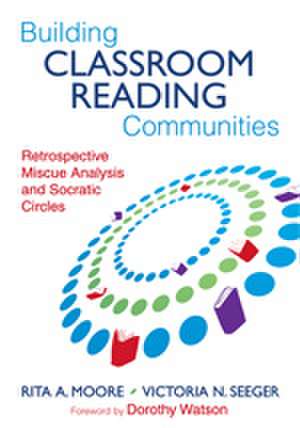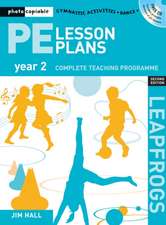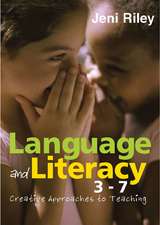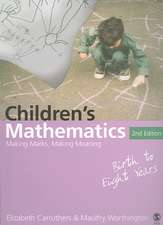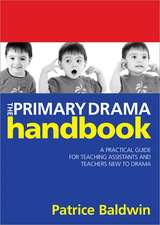Building Classroom Reading Communities: Retrospective Miscue Analysis and Socratic Circles
Editat de Rita A. Moore, Victoria N. Seegeren Limba Engleză Paperback – 21 dec 2009
Kansas State University
How can teachers ensure that each child becomes a better reader? Building Classroom Reading Communities presents a successful approach for motivating students as individual readers while encouraging peer-to-peer learning. By showing how to use Retrospective Miscue Analysis (RMA) and Socratic Circles together, the authors help teachers create a sense of community in the classroom and promote achievement for every student.
The authors show how RMA—which develops students' comprehension and fluency by analyzing their mistakes as they read aloud—can be used to provide a window into each student's progress. The interactive discussion techniques used in Socratic Circles then extend learning in small groups and classwide. Teachers, literacy coaches, and others will find:
- Assessment strategies and step-by-step guidance to implementing RMA and Socratic Circles
- Insights on improving student skills in vocabulary, language structure, comprehension, and other key areas
- Flexible, adaptable techniques for readers of all abilities
- Numerous vignettes showing the use of RMA with Socratic Circles in the classroom.
Preț: 247.52 lei
Nou
Puncte Express: 371
Preț estimativ în valută:
47.37€ • 49.17$ • 39.50£
47.37€ • 49.17$ • 39.50£
Carte tipărită la comandă
Livrare economică 25 martie-08 aprilie
Preluare comenzi: 021 569.72.76
Specificații
ISBN-13: 9781412968010
ISBN-10: 1412968011
Pagini: 168
Dimensiuni: 178 x 254 x 15 mm
Greutate: 0.36 kg
Ediția:1
Editura: SAGE Publications
Colecția Corwin
Locul publicării:Thousand Oaks, United States
ISBN-10: 1412968011
Pagini: 168
Dimensiuni: 178 x 254 x 15 mm
Greutate: 0.36 kg
Ediția:1
Editura: SAGE Publications
Colecția Corwin
Locul publicării:Thousand Oaks, United States
Recenzii
"By using retrospective miscue analysis, teachers can help students improve reading comprehension and fluency. This book emphasizes student strengths and gives students the tools they need to reflect on their reading and become better readers."
"The authors open the windows to a new perspective on reading by merging research-based Retrospective Miscue Analysis with adapted Socratic Circle discussions, thus empowering all elementary readers to collaboratively identify and verbalize reading strategies, individually experience ownership and control as readers, and effectively build both literacy and language confidence and competence within a united classroom community."
"The authors not only clarify the details of examining conversations about reading miscues and retellings, they take you inside Seeger's third-grade classroom. Here you see firsthand how RMA works, from demystifying the coding process for miscues to watching each member of her class benefit from learning in Socratic Circles. Real classroom examples and vignettes, not to mention the variety of reproducible resources included, show how RMA and Socratic Circles engage students at every level of development in critical thinking and critical reflection—activities that empower students' reading development and become an essential assessment tool to guide further instruction."
"Moore and Seeger have developed an approach that combines RMA and SC in such a way that SC functions as a catalyst to greatly magnify the benefits of RMA for groups of students. As students are involved in RMA and SC, they begin to understand how they can use different strategies to make sense of what they are reading and how they are reading. This is quite an extraordinary method to help students become actively aware of their own reading strategies and comprehension processes."
"Moore and Seeger provide an extremely comprehensive look at retrospective miscue analysis and Socratic circles. The powerful snapshots into Seeger's classroom provide invaluable insight on classroom application. The readability of the text and the practical application strategies motivate and inspire educators to really get their students talking about reading."
"Readers will directly experience how productive use of retrospective miscue analysis can become a regular classroom routine. They will find concrete resources for reading and retelling assessment that center reading as an authentic practice, not as a disconnected set of skills. The excellent examples of teaching invite ownership of literacy processes as a classroom community."
"The authors open the windows to a new perspective on reading by merging research-based Retrospective Miscue Analysis with adapted Socratic Circle discussions, thus empowering all elementary readers to collaboratively identify and verbalize reading strategies, individually experience ownership and control as readers, and effectively build both literacy and language confidence and competence within a united classroom community."
"The authors not only clarify the details of examining conversations about reading miscues and retellings, they take you inside Seeger's third-grade classroom. Here you see firsthand how RMA works, from demystifying the coding process for miscues to watching each member of her class benefit from learning in Socratic Circles. Real classroom examples and vignettes, not to mention the variety of reproducible resources included, show how RMA and Socratic Circles engage students at every level of development in critical thinking and critical reflection—activities that empower students' reading development and become an essential assessment tool to guide further instruction."
"Moore and Seeger have developed an approach that combines RMA and SC in such a way that SC functions as a catalyst to greatly magnify the benefits of RMA for groups of students. As students are involved in RMA and SC, they begin to understand how they can use different strategies to make sense of what they are reading and how they are reading. This is quite an extraordinary method to help students become actively aware of their own reading strategies and comprehension processes."
"Moore and Seeger provide an extremely comprehensive look at retrospective miscue analysis and Socratic circles. The powerful snapshots into Seeger's classroom provide invaluable insight on classroom application. The readability of the text and the practical application strategies motivate and inspire educators to really get their students talking about reading."
"Readers will directly experience how productive use of retrospective miscue analysis can become a regular classroom routine. They will find concrete resources for reading and retelling assessment that center reading as an authentic practice, not as a disconnected set of skills. The excellent examples of teaching invite ownership of literacy processes as a classroom community."
Cuprins
List of Figures
Foreword by Dorothy Watson
Preface
Acknowledgments
About the Authors
1. Revaluing Readers: Introducing Retrospective Miscue Analysis (RMA)
2. RMA and the Theoretical Premises Involved
3. Connecting the Reading Process to Miscue Analysis
4. Marking and Coding Miscues for RMA: Simplifying the Process for Classroom Teachers
5. Organizing the Classroom for RMA
6. Assessing Reading Performance Through RMA
7. Informing Instruction Through RMA
8. RMA Conversations Focus the Classroom Literacy Curriculum
9. Socratic Circles and RMA
10. RMA and Proficient Readers
11. RMA and Developing Readers
12. RMA and Striving Readers
13. Concluding Thoughts and Follow-Up Interviews
Resources
Resource A: A Summary of the Research
Resource B: Example of a Marked Transcript
Resource C: Retelling Guide for Narrative Text
Resource D: Retelling Guide for Expository Text
Resource E: Practice Text for Miscue Marking
Resource F: Focusing on Miscues: For Student Reference
Resource G: Reporducible Simplified Miscue Organizer
Resource H: Burke Reading Interview
Resource I: Thinking About Reading: Reproducible Survey
Resource J: Socratic Circles Reproducible Tracking Sheet
References and Resources
References for Children's Literature
Index
Foreword by Dorothy Watson
Preface
Acknowledgments
About the Authors
1. Revaluing Readers: Introducing Retrospective Miscue Analysis (RMA)
2. RMA and the Theoretical Premises Involved
3. Connecting the Reading Process to Miscue Analysis
4. Marking and Coding Miscues for RMA: Simplifying the Process for Classroom Teachers
5. Organizing the Classroom for RMA
6. Assessing Reading Performance Through RMA
7. Informing Instruction Through RMA
8. RMA Conversations Focus the Classroom Literacy Curriculum
9. Socratic Circles and RMA
10. RMA and Proficient Readers
11. RMA and Developing Readers
12. RMA and Striving Readers
13. Concluding Thoughts and Follow-Up Interviews
Resources
Resource A: A Summary of the Research
Resource B: Example of a Marked Transcript
Resource C: Retelling Guide for Narrative Text
Resource D: Retelling Guide for Expository Text
Resource E: Practice Text for Miscue Marking
Resource F: Focusing on Miscues: For Student Reference
Resource G: Reporducible Simplified Miscue Organizer
Resource H: Burke Reading Interview
Resource I: Thinking About Reading: Reproducible Survey
Resource J: Socratic Circles Reproducible Tracking Sheet
References and Resources
References for Children's Literature
Index
Descriere
Developed for teaching learners of all abilities, this guide presents a powerful approach to literacy development for primary students based on individual coaching, classwide discussions, and assessment.
